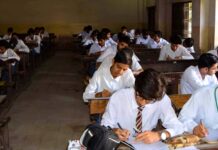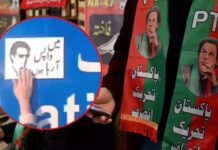As Pakistan marked the seventh anniversary of the Peshawar Army Public School (APS) carnage on Thursday, Prime Minister Imran Khan said the country has “successfully defeated terrorism” and vowed to never “let down the survivors and parents” of those martyred in the tragic incident.
In the deadliest terror attack in the country’s history, 131 schoolchildren and 10 other people were martyred when heavily armed militants stormed the school building on December 16, 2014.
The attack had shocked the entire nation as terrorists stormed inside the school and fired at children who were attending classes at the time.
The commander of the banned Tehreek-i-Taliban Pakistan (TTP), Umer Mansoor alias Umer Narae, had claimed responsibility for the APS carnage. The US government and Pakistan Army later confirmed that Umar was killed in a US drone strike in Nangarhar province of Afghanistan on July 9, 2016.
Recalling one of the darkest days in Pakistan history, the prime minister said in a tweet today that there will be “zero tolerance for violence and those using it as a tool.”
‘Have we learnt any lessons?’ asks Shehbaz
Leader of the Opposition in the National Assembly, Shehbaz Sharif, called it a painful day for the nation and asked: “Have we learned any lessons and corrected our course?”
“When will we sincerely put our heads together for better future of our children? There are too many questions but too few answers,” he said in a tweet.
Innocent souls still waiting for justice, says Bilawal
Chairman Pakistan Peoples Party Bilawal Bhutto Zardari said the nation still felt the pain of “this great tragedy”, adding that “everyone is still waiting for justice to be served to the innocent souls.”
As per the national wire service APP, he also demanded that the “beasts” that planned, facilitated, and carried out the massacre of the innocent children and teachers be brought to justice.
On December 24, 2014 — a week after the terrorist struck, then prime minister Nawaz Sharif announced a comprehensive strategy to defeat what many had come to believe was an existential threat to Pakistan.
Sharif had called the 20-point National Action Plan (NAP) that had come about after two days of marathon meetings of heads of parliamentary parties, a ‘defining moment’ in the fight against terrorism. “A line has been drawn,” a sombre Prime Minister had told the nation.
The plan also included steps for the registration and regulation of seminaries, a ban on the glorification of terrorists in the media, Fata reforms, dismantling of the communication networks of terrorists, measures against abuse of the internet and social media for terrorism, reversing the trend of militancy, a Karachi operation to end lawlessness and to deny space to militants and extremism.
The NAP had called for steps to reconcile the dissident Baloch, ending sectarian terrorism, repatriation of Afghan refugees and revamping the criminal justice system.
Meanwhile, earlier this month, Human Rights Minister Dr Shireen Mazari had that the government had decided to review the NAP on counter-terrorism in the wake of the brutal lynching of a Sialkot factory manager Priyantha Kumara — a Sri Lankan national — over blasphemy allegations.
The human rights minister had expressed worry over growing “extremism” in the country, saying the NAP had to be fully enforced to combat the menace.




